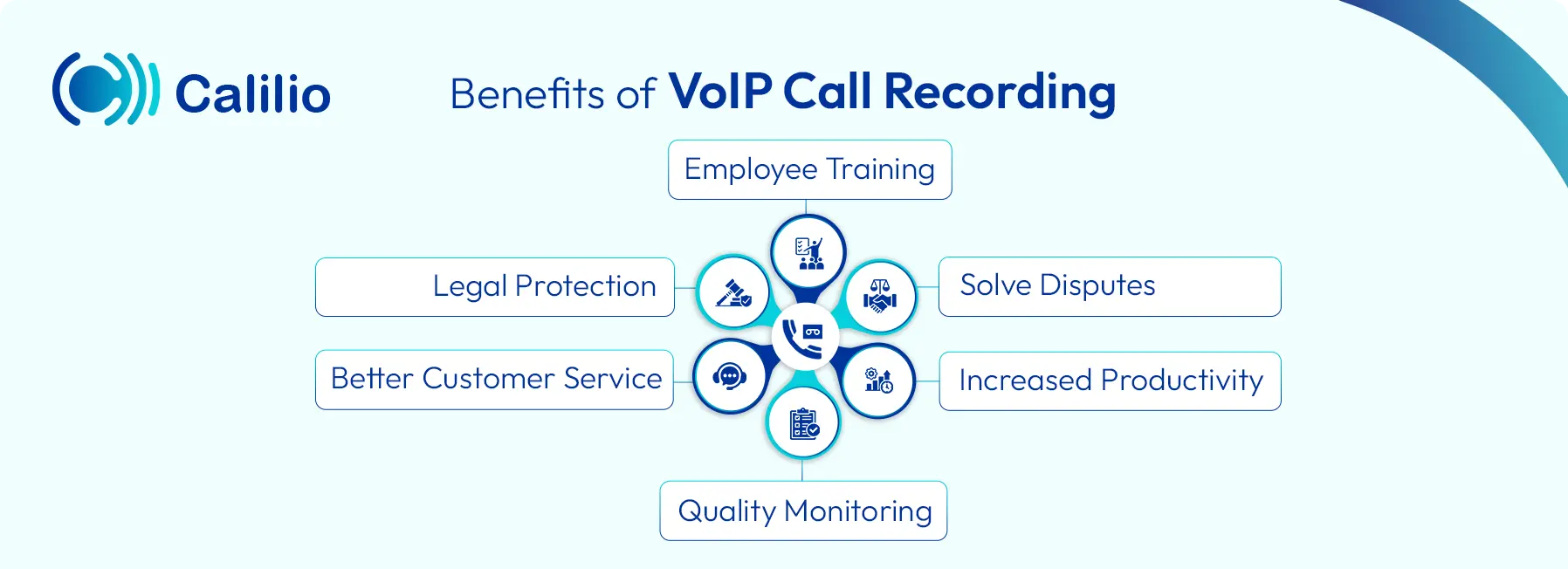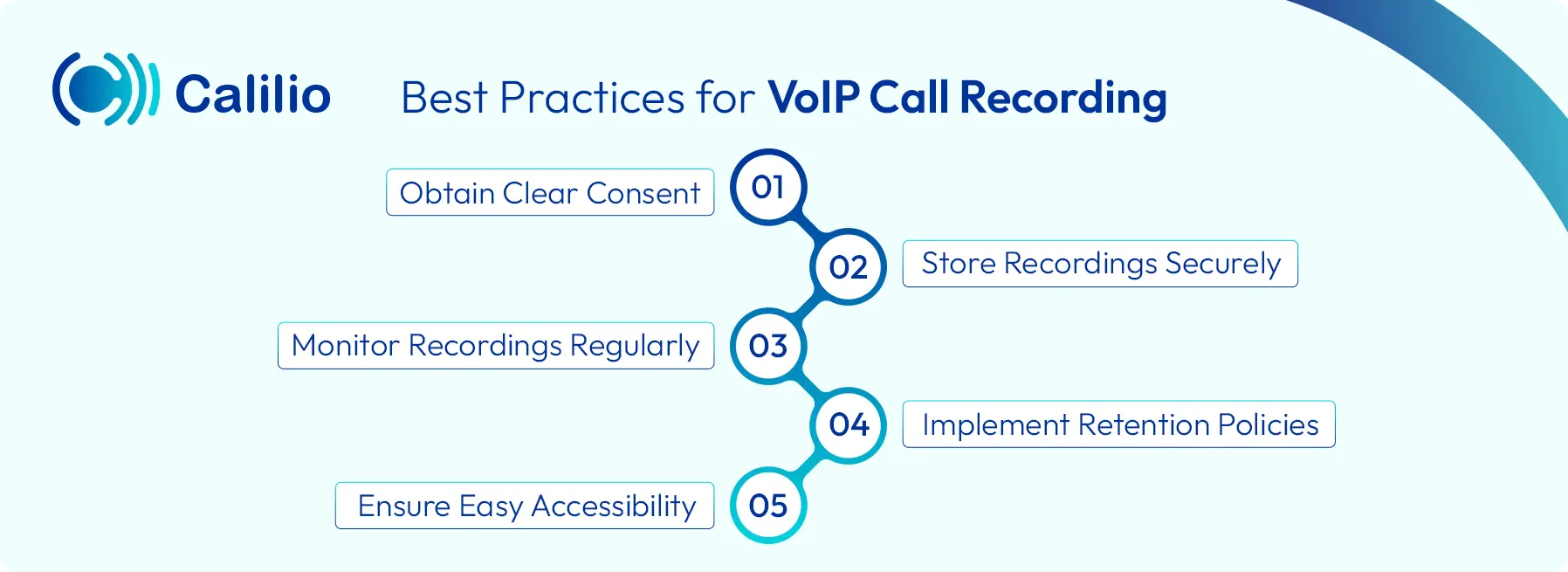What is VoIP Call Recording: Overview, Types, & Benefits

Call recording is crucial for businesses to keep track of important conversations, improve customer service, or ensure compliance with legal requirements. Without proper call recording, businesses risk losing important call details, facing difficulties during dispute resolution, and failing to provide adequate training and feedback to employees.
VoIP call recording addresses these points by allowing businesses to automatically record all calls in one place. This eliminates the risk of missed information during important calls, ensures accurate dispute resolution, and supports employee training with real call examples. Additionally, VoIP call recording helps maintain compliance with legal requirements, particularly in industries like finance and healthcare.
Stay tuned. In this blog, we’ll explore everything you need to know about VoIP call recording, including its types and benefits. Additionally, we’ll also provide tips to set up one for your business.
Keep reading!
Key Highlights:
VoIP call recording captures and stores conversations over the internet.
There are three main types of VoIP call recording: manual, automatic, and custom rule-based.
VoIP call recording enhances customer service, ensures compliance, resolves disputes, increases productivity, and improves call quality.
To effectively implement VoIP call recording, obtain clear consent, store recordings securely, implement retention policies, and ensure easy access for authorized personnel.
What Is a VoIP Call Recording?
VoIP call recording is a feature in VoIP phone systems that allows businesses to capture and store phone conversations over the internet. Unlike traditional landlines, VoIP systems record calls digitally and store them in the cloud. You can easily access them for playback and analysis.
How Does a VoIP Call Recording Work?
VoIP call recording captures the digital packets carrying voice data during a VoIP call, converts them into an audio file, and stores them in the cloud or a local server for future use. When a call is made, the VoIP system records the conversation and stores it in a digital format. You can play back the recording, download it, or even transcribe it for reference.
Here’s a breakdown of the process:
- Initiating the Call: When a VoIP call is made or received, the VoIP system begins monitoring the conversation.
- Converting Voice Data: The system converts the voice signals into data packets, which are transmitted over the Internet.
- Recording the Conversation: As the call continues, the VoIP system captures these data packets in real time and stores them as an audio file.
- Storing the Recording: Once the call ends, the recorded file is saved to either the cloud or a local server, depending on the business’s setup.
- Access and Playback: Businesses can easily access and playback these recordings at any time for training, review, or dispute resolution.
Types of VoIP Call Recording
There are three main types of VoIP call recording methods: manual, automatic, and custom. Each method offers flexibility based on business needs and call handling preferences:
- Manual Call Recording: The user manually activates the recording feature during a call. This gives users complete control over which calls are recorded, allowing them to record only those that are important to them.
- Automatic Call Recording: With automatic recording, all calls are recorded by default. This ensures that every conversation is captured without requiring user intervention.
- Custom Call Recording: Some systems let businesses set specific rules or triggers for when to record calls. For example, you can configure the system to only record calls lasting more than two minutes or calls involving specific topics.
Get A VoIP Phone System With an In-built Call Recording Feature!
Automatically record all your inbound & outbound calls, playback recordings, and download transcripts with AI-powered call summary and sentiment analysis.
What are the Benefits of VoIP Call Recording?
VoIP call recording helps businesses improve customer service, ensure legal compliance, and enhance employee training. It also aids in resolving disputes, boosting productivity, and monitoring call quality to maintain high service standards.

- Better Customer Service: VoIP call recording helps businesses track calls, improve service, and identify areas for improvement.
- Legal Protection: It helps businesses meet legal requirements by recording calls for compliance and providing evidence if needed.
- Employee Training: Recorded calls serve as training tools for new employees, helping them learn better communication skills.
- Solve Disputes: If there's a disagreement, recorded calls can be checked to clarify what was said and resolve issues.
- Increased Productivity: Employees can review recorded calls instead of relying on memory, saving time and improving work efficiency.
- Quality Monitoring: VoIP call recording helps check if employees are following scripts or handling calls as expected, making it easier to maintain high service standards.
How to Set Up Call Recording on a VoIP System?
To set up call recording on a VoIP system, log in to your provider's online portal or app, then navigate to the call recording settings and activate it. You can usually choose between automatic or manual recording and set where recordings are stored.
While the exact process may vary with different VoIP providers, the following are the general steps common with most providers:
- Log in to your VoIP provider's account.
- Go to your service Settings.
- Find the Call Recording settings.
- Turn on the call recording feature.
- Choose your preferred recording options (Manual or Automatic recording).
- Set up announcement messages, decide on storage, and manage access to recordings.
- Save your settings.
Best Practices for VoIP Call Recording
To record VoIP calls effectively, ensure you obtain consent, store recordings securely, and monitor them for quality. Additionally, establish retention policies and provide authorized personnel with easy access as needed for training or compliance purposes.

- Obtain clear consent: Get permission from all parties involved before recording any calls. It is essential for ensuring compliance with call recording and monitoring laws.
- Store recordings securely: Store recordings in encrypted cloud storage or on a protected server. It helps prevent unauthorized access and ensures sensitive data remains safe.
- Monitor recordings regularly: Track your recordings frequently to ensure they meet your quality standards. This helps identify areas for improvement in your customer service.
- Implement retention policies: Set clear guidelines for how long you’ll keep recordings before securely deleting them. This is necessary to comply with legal data retention requirements and avoid clutter.
- Ensure easy accessibility: Provide authorized personnel with easy access to recordings, especially when they are needed for training, dispute resolution, or compliance purposes.
Conclusion
VoIP call recording is a vital tool for businesses seeking to record phone calls to enhance customer service and ensure compliance with regulatory requirements. It helps companies track performance, train employees, resolve disputes, and gather insights that can lead to better customer experiences.
Summarize this blog with:
Frequently Asked Questions
Is VoIP call recording legal?
Yes, as long as businesses obtain consent from the involved parties, recording VoIP calls is legal.
Can I transcribe VoIP call recordings?
Is VoIP call recording a safe and secure practice?
How long are VoIP call recordings stored?
How does VoIP record calls?

Still have questions?
Can’t find the answer you’re looking for? Please chat with our friendly team.
Stay in the loop
Get the latest call insights, trends, and updates delivered straight to your inbox.
By subscribing, you agree to receive updates from Calilio.
You can unsubscribe anytime.
